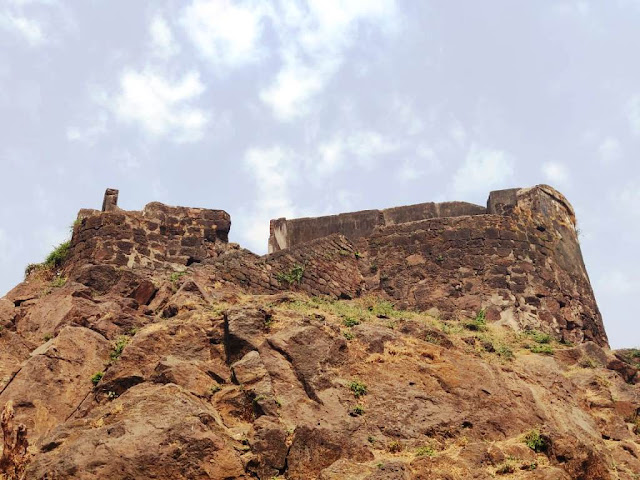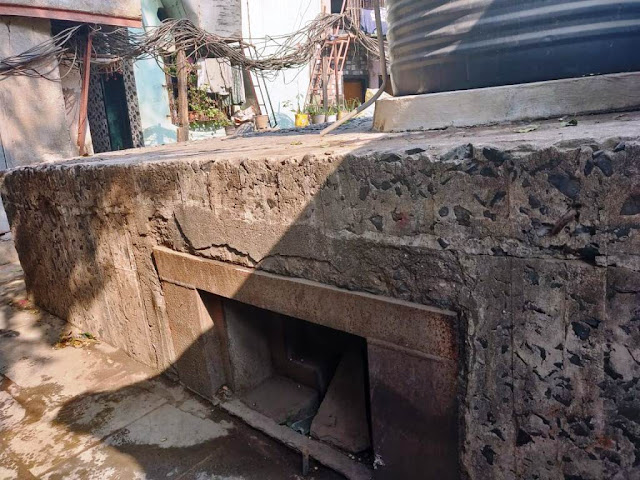 |
| Sion Fort |
Sahapedia has come up with
Indian Heritage Walk Festival which they are celebrating throughout the month
of February. In totality they will be conducting numerous walks in more than 40 cities in India.
I
attended the heritage walk in Sion which was held on February 3, 2019, 9:00 AM
– 11:30 AM and was led by Ashwini Nawathe.
When
you travel on the central line of the local railways in Mumbai, we have all
heard –
“Pudhil Station Sheev,
Agala Station Sion,
Next Station Sion”.
Agala Station Sion,
Next Station Sion”.
But
how many of us know what Sion means?
Sheev as Sion is popularly
known in Marathi means limit or boundary. Back in the 17th
Century Sion formed the boundary between the Mumbai Island and the Salsette
Island (Thane).
Seven Islands of Bombay
Back in the 16th
Century and earlier, Bombay was a cluster of Seven Islands which were a part of
the Silhara Dynasty and the Sultan of Gujarat. These islands were then captured
by the Portuguese around the 16th Century which were later handed
over to the British as a part of the dowry of Catherine of Braganza (from
Portugal) when she married Charles II in 1661.
The islands handed over to the
British were:
- Isle of Bombay
- Colaba
- Old Woman’s Island (Little Colaba)
- Mahim
- Mazagaon
- Parel
- Worli
 |
| Seven Islands of Bombay PC - Wikipedia |
After acquiring the islands as
dowry, Charles II rented the islands to East India Company. By 1845, the
islands had been merged through various land reclamation projects.
Heritage Walk
We all met our walk leader Ms.
Ashwini Nawathe near the ticket counter of the Sion railway Station. Our first
stop was to “Our Lady of Good Counsel Church” which is just next to the Sion
Railway Station. Our Lady of Good Counsel Church is one of the oldest churches
in Bombay. Initially it was a chapel and was affiliated to the St. Michael’s
Church at Mahim. The chapel was separated from Mahim and was entrusted to the
Franciscans. The chapel was then converted into a Church.
The church also houses a
convent co-ed school which is more than 100 years old. On your visit to the
church, don’t miss the beautiful stained glass windows of the church.
 |
| Our Lady of Good Counsel Church |
Next came the up-hill walk just
next to the ayurvedic hospital in Sion. Here on the uphill you can see watch
towers which were made for fortifying the northern frontier of Bombay. In order
to fortify Bombay various forts were made namely – Worli Fort, Mahim Fort,
Bandra Fort, Dharavi Fort (Kalla Killa), Sion Fort & Sewri Fort.
Strong fortifying was done by
the British on the places where the Marathas and Portuguese had made small
watch towers etc. This Hill was blasted twice – once to make space for laying
the railway tracks for the Central Line and second time to make way for the
Eastern Express Highway. If these blasts had not taken place the hill directly
extends till the Sion Fort.
 |
| Uphill Walk |
This land is marked as “Villa
Residence” is actually a sanatorium of ayurveda.
One close look of the
architecture of the building you will notice that it is a mix of Gothic &
Renaissance structure which is known as “Maunlein” style. Have a look at the
pillars which clearly reflect the Roman Style.
At one entrance of the
sanatorium the inscription is engraved in wood in English and at the other
entrance in Gujarati. Please note that the year of construction has been carved
out (May be they don’t want the building to gain a heritage status).
 |
| Villa Residence |
We walk down the stairs and
also the hill and we come across a beautiful green painted bungalow which was at
that time, the last house on the Mumbai Island City. The owner of the house
recalls his childhood days (atleast 60 years back), when the area was unsafe at
night – as it was wild and had jackals roaming around post dusk.
Once on the main road you come
across a pond next to the Dwikuta Temple (Dwi means two and kuta means kalash) of
Shiva and Parwati. It is said that the pond never goes dry.
Next stop on the walk is the
Dunkan Causeway. While walking to the Dunkan Causeway we were reminded that we
are walking on the reclaimed land, this the place where there was a creek and
boats and ferries used to dock. The people living near the creek used to cross
the creek for daily necessities (food, etc.), for which they needed to pay
customs once the goods were unloaded on the Sion side.
Today though Dunkan Causeway has
been renamed, the only sign of its erstwhile name is the sewage pumping station
(of BMC). Inside the Dunkan Casueway we saw two milestones which states – “9
Miles from St. Thomas Church” and “7 Miles from St. Thomas Church”. Just for
your ready reference St. Thomas Church is near Asiatic Library in South Bombay.
It was near Asiatic library that the townhall was located and the Bombay
milestone there showed Zero Miles.
 |
| Dunkan Causeway |
 |
| Milestone |
Just next to Dunkan Casueway
there is a underground storage house where the ammunition were stored at the time of World War II.
The structure is so strong that no one has been able to even drill a hole for
fixing a light bulb or a water connection.
Next and the last stop of the
Walk was the very obvious – Sion Fort.
 |
| Ammunition Storage |
 |
| Inside Sion Fort |
 |
| Sion Fort |
 |
| View from Sion Fort |
Post this we discussed about
other prominent things in Sion which we can explore on our own namely:
Lokmanya Tilak Municipal
General Hospital, popularly known as Sion Hospital was started in 1947 with 10
beds and today boasts of more than 1400 beds. A medical college is also
attached to the hospital and is one of the best govt medical college in Bombay
(after KEM).
Gandhi Market is a popular
market which predominantly caters to women Indian Wear. Gandhi Market is not
very far from Sion Station and it was established around 1949-50 by refuges from
Pakistan. Even today few shops are run by the family members of the refugees
and will have lot of stories to share with you.
Shanmukanandan Hall – This is
known to be one of the center pieces of theatre in Mumbai. It is one of the
first theatres of Mumbai and boasts of a seating capacity of over 2000. It is
also equipped with modern stage change equipment
And with this we came to the
end of the highly engrossing heritage walk. I would like to offer sincere
thanks to Ashwini Nawathe and Sahapedia IHWF for the efforts and time.
 |
| With IHWF notepad & pen |
There are many walks being
conducted in Mumbai and various other cities in India in the month of February.
In case you are interested please go through their website www.indiaheritagewalks.org/

No comments:
Post a Comment